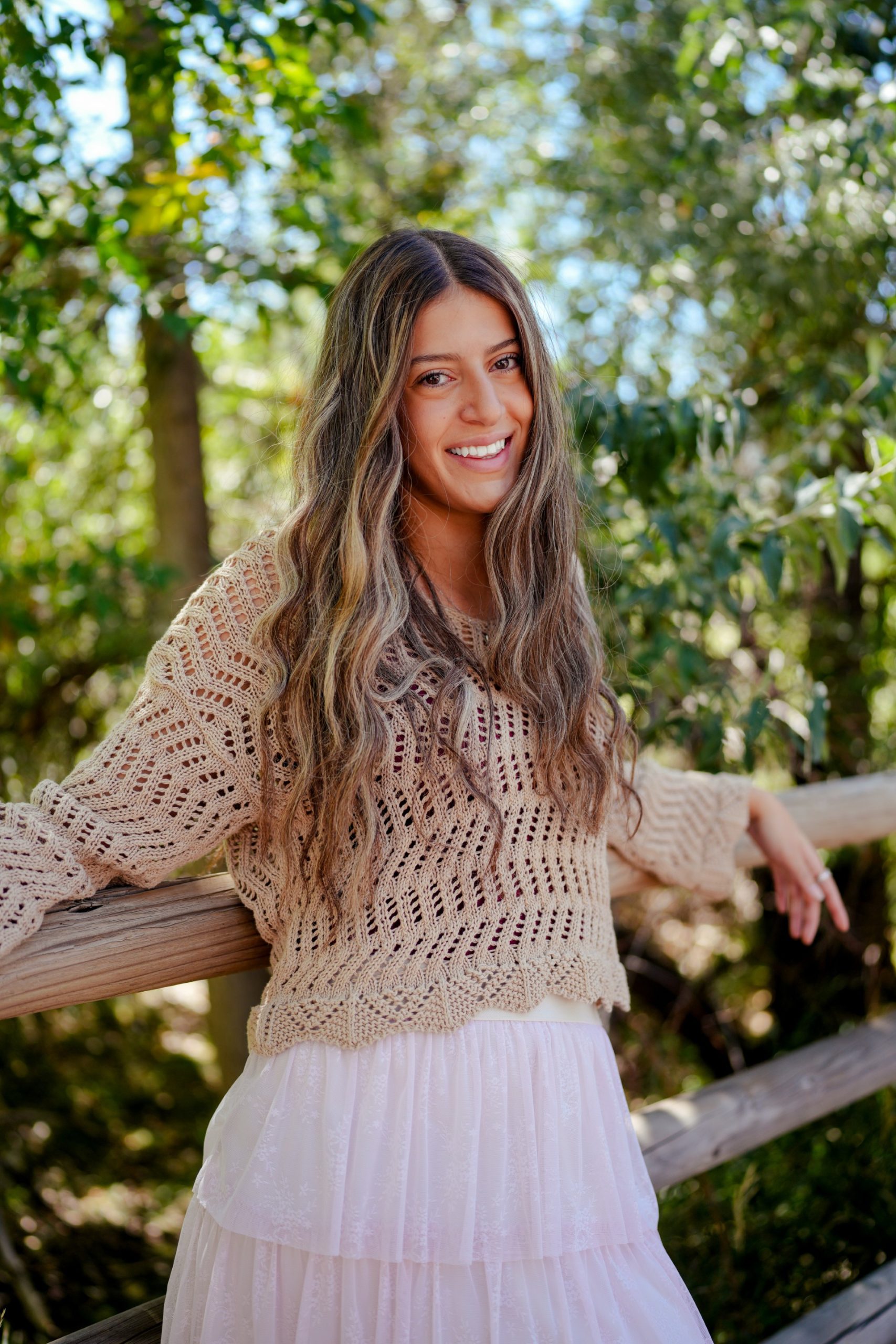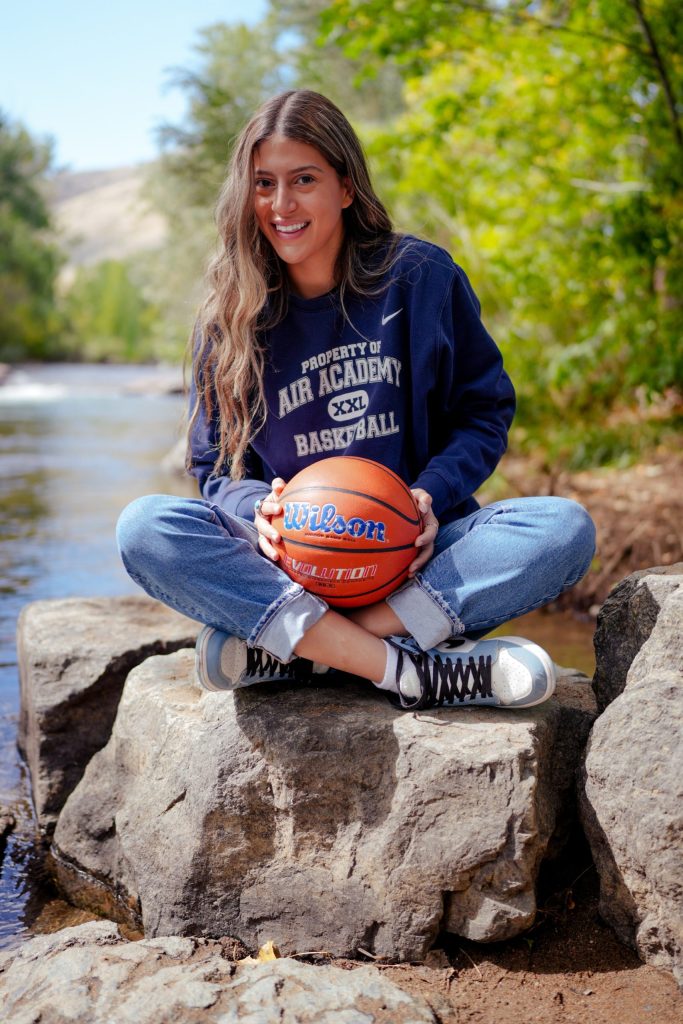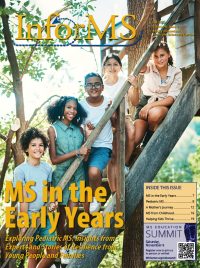
For Ramah, MS has been part of life since childhood. Diagnosed at age 10 after years of unexplained symptoms, she quickly learned how invisible the disease could be to others—and how disruptive it could feel to her daily life. Now 18, she reflects on the challenges of growing up with MS, from navigating treatment and school to finding her voice as an advocate. Ramah’s story is one of strength, determination, and the power of redefining what it means to thrive with MS.
InforMS: Can you tell us a little about yourself and when you were first diagnosed with MS?
Ramah: My name is Ramah, I’m 18 years old, and I grew up in Colorado. I come from a big, family-centered household with two sisters, and my family’s background is Palestinian and Jordanian.
I was officially diagnosed with multiple sclerosis when I was about 10 years old, but I had started showing symptoms around age 8. At the time—this was 2015, early 2016—childhood MS wasn’t really on anyone’s radar. Doctors just weren’t looking for it because they didn’t think it happened in kids.
I still remember the day I got the diagnosis. It didn’t even happen at the children’s hospital where I had been receiving care. Instead, I was diagnosed across the street at the adult hospital, which was pretty scary as a kid.
That experience has shaped a big part of who I am today. It also made me really passionate about advocating for childhood MS. Since it’s so rare, the community is small, and I think it’s important for us to stick together and support one another.
InforMS: What do you remember about the time leading up to your diagnosis?
Ramah: The first big sign for me and my family was that I started having seizures, but they weren’t the “classic” type where you shake all over. Mine were different. I’d get this terrible stomach pain, and when it hit its peak, my whole body would stiffen and freeze, and my eyes would roll back. Along with that came nausea and vomiting—it was a lot for me and for my family to process.
After that, the next big symptom was headaches. They became so constant that I honestly thought that’s just how everyone felt. I didn’t even think of it as “having a headache,” it was just my normal.
I was also really tired all the time, which stood out because at that age—late elementary, early middle school—most kids have endless energy. I couldn’t keep up. My legs hurt when other kids were running around without a problem. It left me wondering, “What’s wrong with me?”
It wasn’t just physical symptoms either. MS is really silent on the outside, but it’s incredibly loud for the person living with it. Even though I didn’t have as many severe physical symptoms early on—since we caught it relatively quickly—I felt the mental and emotional weight of those small but constant physical changes every day.
InforMS: What role did your doctors and care team play in helping you and your family understand what was happening?
Ramah: At first, I didn’t really have a specialist who knew to look for MS, but I did see an amazing neurologist. He was a general pediatric neurologist, and at the beginning, everyone was almost sure I had epilepsy. They kept waiting to catch a seizure on an EEG, but nothing ever showed up. On paper it looked like epilepsy, but if you actually talked to me or looked at my life, something just didn’t fit.
This neurologist could have easily said, “We’ll just keep looking” or even started treating me for epilepsy, which other doctors were already suggesting. In fact, I did try different seizure medications, but they didn’t work, because the problem wasn’t epilepsy—it was MS. He was the one who went the extra mile, who stayed on top of my case, and who eventually pushed for me to be seen at the adult hospital. That was a huge turning point.
It was especially scary for my mom, because her sister has very severe MS. So when my neurologist told my parents this might be MS, my mom immediately thought of what she had seen her sister go through. But he didn’t just give us the diagnosis and leave us on our own—he made sure we had support, like therapists and social workers, and he got me into the MS Center at Anschutz.
I started to see Dr. Schreiner, who is a pediatric neurologist. And she’s been incredible. I honestly wouldn’t be where I am without her. She’s always been there for me and my family, and started the multidisciplinary clinic at Children’s Hospital, which is where I get my MS care now. It’s been such a crucial, supportive place for me.
So between Dr. Bernard, Dr. Schreiner, her nurse Julie, and the whole team at the Rocky Mountain MS Center and the multidisciplinary clinic—I’ve had this entire “village” behind me, and that has made all the difference in where I am today.
“MS has been with me since childhood. It’s part of who I am, but it doesn’t define me.”— Ramah
InforMS: What was it like for you going through middle and high school while managing MS?
Ramah: In middle school—and honestly for the first couple years of high school too—the diagnosis was still really fresh. Since MS isn’t something people can see, I kind of had this mindset of, “If they can’t see it, then it’s not there.” I knew it was real, but I didn’t really want to talk about it. I wasn’t ashamed exactly, but I felt uncomfortable with the idea of being different. So there was definitely an “embarrassment phase.”
At the same time, I didn’t like letting MS stop me. That meant there were plenty of days when I had terrible migraines or fatigue, but I still showed up for school because I had a test or something important going on. When you do that enough, and when you also miss school for appointments or infusions, people start to notice. At first, when classmates asked questions, I would just brush them off—say I got sick a lot, or that I had a weak immune system. It wasn’t untrue, since the medication I take makes me more vulnerable, but I definitely wasn’t being open about the real reason.
It wasn’t until the end of my sophomore year, maybe into junior year, that I started feeling more comfortable telling my close friends. I’d say things like, “I can’t hang out because I have an infusion today,” or, “I’m just not feeling well because of treatment.” Then, by senior year—after being more involved with the MS community, and even learning from my sister, who also has MS—I realized: why am I hiding this? It’s not like I did anything wrong. And actually, it’s kind of powerful to say, “At one point doctors told me I might never play sports or go to college, and now I’m doing both.”
I’ve learned that MS doesn’t define me—it’s just a chapter in my life. Before, if that chapter came up, I’d try to slam the book shut. Now, I’m willing to read it out loud and share it, because I know other people are going through the same thing. And honestly, it’s more exhausting to keep it all bottled up than it is to just talk about it once and let people understand.
InforMS: Were there certain challenges that stood out to you during your teenage years?
Ramah: Definitely. I think there were both physical and mental challenges.
On the physical side, I’d say one of the hardest things was how little information there was about childhood MS. I remember turning to Google, and honestly, “Dr. Google” can be an MS patient’s worst nightmare—especially when you’re young and don’t know which sources you can trust. For me, the only example I really had was my aunt, who also has MS and is fully immobile now. So between seeing what she was going through and reading all these scary things online—like, “By 25 you might not be able to walk, or you’ll have major cognitive issues”—that was really overwhelming. And while those outcomes aren’t impossible, reading them as if they were guarantees was terrifying for both me and my parents.
The other big physical challenge was treatment. When I was diagnosed, there weren’t any medicines approved specifically for kids. I was put on one that was still in trial for children, and it ended up really damaging my vision—I had almost perfect eyesight before, and it was suddenly just gone. Now I take rituximab, which is technically a medication for rheumatoid arthritis, but it works really well for MS. The thing is, none of it was straightforward. It always felt like we were figuring it out as we went, which added to the stress.
And then there’s the mental side. Being a teenager is already the time when you’re trying to figure out who you are, and the last thing you want is to feel different. But MS made me feel different, whether I wanted it to or not. When you’re told at that age, “You have multiple sclerosis,” it’s so easy to mistake that for being your whole identity instead of realizing it’s just part of who you are. That was really tough to navigate.
“I had to learn how to speak up for myself. That’s been one of the hardest and most important lessons.”— Ramah
InforMS: What are some moments of resilience or strength that surprised you?
Ramah: That’s such a good question, because resilience and strength are really at the core of being a young person living with multiple sclerosis. When I was first diagnosed, a lot of neurologists—aside from Dr. Bernard and Dr. Schreiner—told me I shouldn’t do certain activities. They weren’t sure if symptoms could be triggered by overexertion, so the message was basically: “Don’t push it.” Some days I would wake up and feel like I didn’t want to move at all, and the advice I got reinforced that.
But the strange thing with MS is that, even though it makes you feel like you never want to get up again, the reality is that movement is essential. You have to move for your MS to be better. That contradiction was hard to understand at first.
So there came a point where I thought, Why am I letting other people decide what I can and can’t do? Of course, I respected the doctors—they’re the professionals—but I also felt strongly that I needed to advocate for myself. I kept messaging Dr. Bernard and Dr. Schreiner through the portal, asking, “Can I try this? Can I do that?” And what I learned is that you can often find a middle ground. Doctors tend to start from the most cautious place and then adjust, but if you’re persistent and informed, you can usually work together to figure out safe ways forward.
For me, that meant finding alternatives when sports weren’t possible. At one point, because of seizures, the answer was a firm no to contact sports, no matter how much I pushed. So I turned to other outlets—chess club, robotics. Those things may not have been “typical kid” activities, but they gave me independence, challenge, and joy.

Ramah graduated high school just a few months ago, and is now a college student.
For parents, I’d encourage them to keep an open mind. Don’t be overly hands-off, but understand that your child is trying to make up for areas where they feel limited. And for kids, I’d say: don’t let anyone put you in a box. Take time to figure out what works for you and what doesn’t, but then dive in and try new things. Holding yourself back only makes things harder. With MS, the mental fight is half the battle, and finding things that keep you motivated and fulfilled is a huge part of staying resilient.
InforMS: How has physical activity played a role in your journey with MS, and what have you learned about staying active over time?
Ramah: All throughout middle school and high school—so about two years after I was diagnosed—I started playing basketball. That’s what a lot of people know me for. I almost played in college, but ended up choosing a different academic scholarship that was a better fit for me. Still, basketball has been such a huge love of mine.
Outside of that, I’ve always been active. Every weekend I’m out hiking, I really enjoy rock climbing, and I’m planning to do more of that in college. In the winter, I ski. In high school, I also did track and soccer. More recently I’ve gotten into cycling, and that’s something I hope to keep up.
But I think it’s important to say that it’s not only about organized sports. Sometimes it’s going out for a walk with your family, or finding a way to move that feels right for you. With MS, movement is essential, even if you start small. Maybe at first it’s just walking around the block. If that feels good, you move to the next step. That’s exactly how it was for me—my dad wanted to see me running comfortably before I tried basketball. So we started with track, and then built up from there.
Something I’ve learned is that you don’t have to do everything all at once. I used to feel like everything had to happen now, because that’s what I saw everyone else doing. But really, it’s like climbing a ladder. When you’re on each step, it doesn’t feel like much is changing—the view looks the same. But then one day, you look back, like I did after graduating high school, and realize how far you’ve come. The view from the top is completely different. You just don’t always feel the progress in the moment. So my advice would be: keep climbing.
InforMS: What kind of support from family, friends, or teachers was most helpful to you?
Ramah: For me, the most important thing was simply having people be there. I don’t think it’s realistic for anyone—even my family—to fully understand what I was going through. My sister also has MS, but even then, our experiences were completely different. You can be the same age, with the same diagnosis, and still not be fighting the same battle.
At first, my family tried to connect the dots with their own experiences—like my dad being sick in the past, or my mom’s sister having MS, or my other sister studying medicine. But I realized what helps most is when family and friends don’t assume they fully understand. Instead, it’s about paying attention to what the person with MS needs in the moment.
For me, that meant independence. I liked figuring things out on my own before sharing them with my parents. If I went to them too quickly, when I was upset or frustrated, it often turned into arguments or them mirroring my frustrations. It helped more when they gave me the space to process and then supported me once I was ready to talk.
With friends, one of the hardest things was how differently people treated me after they found out I had MS. Even though I was pretty stable—just occasional fatigue or missing a day of school for infusions—people started treating me like I was fragile, almost like I needed to be wrapped in bubble wrap. That wasn’t helpful. The best support was when they treated me like myself, not like “the sick kid,” while still being there if I needed them.
Teachers were a mixed experience. Some of my favorite teachers had great teaching styles, but we clashed when they didn’t follow my 504 plan. A lot of them looked at my grades or the way I presented and assumed I didn’t “look like” I needed accommodations. But my 504 plan was there for the times I really did—like when I’d come back from a treatment and was too fatigued to take a test that same day.
On the flip side, some teachers overdid it—like moving a test for me just because I’d had a regular orthodontist appointment. What I needed most was balance: treating me like any other student, but also being flexible when MS actually interfered.
And honestly, the common thread across family, friends, and teachers is communication. MS is invisible, so people can’t guess what I need. Checking in with me, asking, and keeping that open dialogue made the biggest difference.
InforMS: What do you wish other kids or teenagers with MS knew? What would you want parents of children with MS to hear? And finally, what message would you share with the broader MS community?
Ramah: For kids and teens, I want you to know you’re not alone. When you’re first diagnosed, or when you’re having a rough time, it can really feel that way. But remember to look at the glass as half full. I used to see everything as half empty—it all just felt awful. What changed things for me was learning to advocate for myself, keep pushing forward, and focus on the positive. Doctors may sometimes play it safe, but you’re the one fighting for yourself, so make your voice heard.
For parents, I’d say: try to understand your child’s perspective. Yes, they’re still young, but it’s their body, and they’re the only one who can truly feel what MS is like. Communication is key—ask questions, listen to what frustrates them, and find ways to compromise. My parents also took the time to learn as much as they could from reliable sources—like webinars at the Rocky Mountain MS Center—and that really helped. And try to make hospital visits a little brighter. For me, my dad brought circuit board kits and mini chess sets, and now I’m studying electrical engineering. You never know what small interest could turn into a lifelong passion.
And for the MS community—whether you’re a doctor, a family member, or another patient—remember that everyone is living life for the first time. No one is a seasoned veteran in this. Even the most experienced doctors haven’t lived your case of MS. Take life one step at a time, and don’t compare your story to someone else’s. Learn from others, yes, but write your own path.






